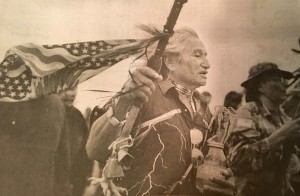Phil Little Thunder Sr. joined the protest of the Standing Rock Sioux Tribe in North Dakota – an iconic figure marching with thousands from other tribal nations – in order to stop a noxious crude oil pipeline from tunneling under Lake Oahe, a tribe’s crucial water source, fearing the pipe will leak its oleaginous poisons into these life-giving waters, and because the line, if not adjusted, will destroy the tribe’s burial grounds, and historic and ancestral cultural sites.
The proposed Dakota Access pipeline, if allowed to proceed, under the auspices of “Energy Transfer Partners,” would travel 1,170 miles, crossing the Sioux land, en route to the Gulf coast.
You may think this has nothing to do with the Commonwealth of Virginia. But there are lessons to learn so we may resist the risky fossil fuel industry energy choices close to home including Dominion’s effort to lay 550 miles of fracked gas pipelines within feet of the homes of many Virginia landowners, at the risk of these volatile gases exploding, as did occur in Appomattox, Virginia.
We can’t count on the General Assembly, not the Democratic nor Republican parties, as Dominion has showered its financial largesse on key members of both parties.
The success or failure in fighting this Dakota pipeline and the key lessons learned from the defeat of the XL pipeline instruct us how to represent ourselves when those elected fail to represent us.
Last Friday, U.S. District Judge James E. Boasberg denied the tribe’s demands to stop the pipeline, saying that the tribe had failed to show “it will suffer injury.” In what alternate universe is the risk that a critical water source may be destroyed not a cognizable “injury?”
This Oahe Lake was created by a dammed section of the Missouri River a half century ago so that the Sioux would have these waters to make their community viable; it must be a question the tribes consider today, could this pipeline have been diverted to cross tribal land to compromise or destroy the tribe’s water supply forcing the tribes off the land?
As the energy company appeared poised to run over the tribe, with Judge Boasberg’s questionable ruling in its breast pocket, the U.S. Army, the U.S. Justice Department and the Department of Interior said they would stop the work of the pipeline temporarily.
The government is now going to review its decisions that granted permits for this pipeline. But is it, in truth and fact, calculated to run the clock instead, and to divert public attention until the pipeline may proceed as the “Energy Transfer Partners” prefer it to proceed?
The pause in laying the pipeline, the break in the impenetrable resistance to the tribe’s demands, comes from the tribe’s peaceful protest, and that they were abused.
Native Americans got their heads knocked, were bitten by attack dogs, maced, and, because of their peaceful and insistent message, and the abuse they suffered in response, amassed supporters and drew favorable news media coverage for the energy company’s savage attacks.
No law enforcement protected the Native Americans when the energy interests abused them, and the abuses were shown across the nation. The practice the tribes followed was a polite insistence on the truth.
Increasingly, if our best interests are not represented by elected officials, we shall have to represent ourselves, and we may have to mimic what the tribes have had to do in North Dakota.

